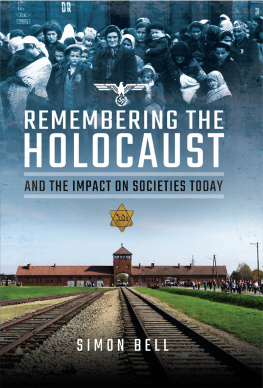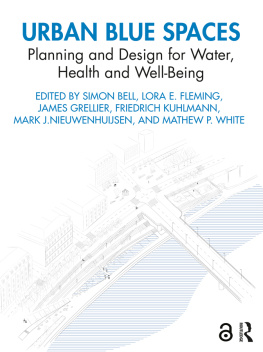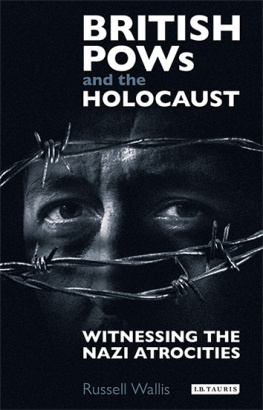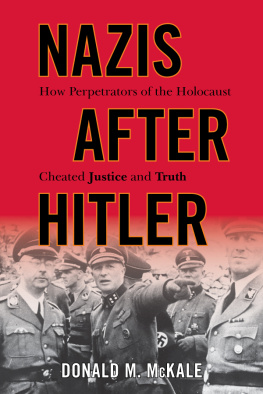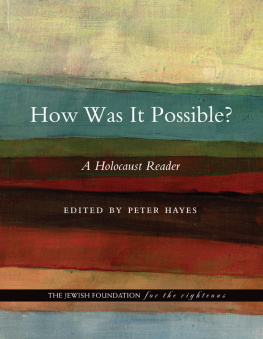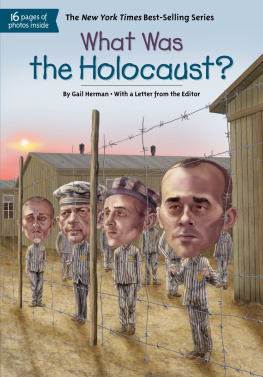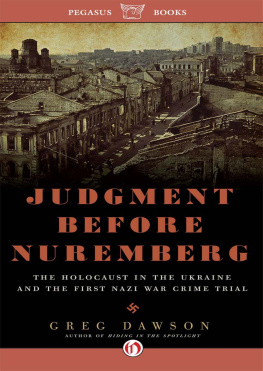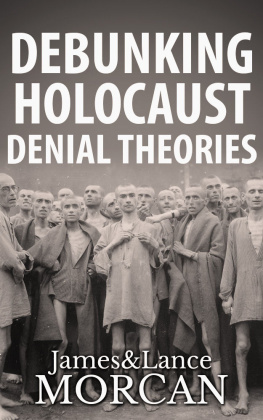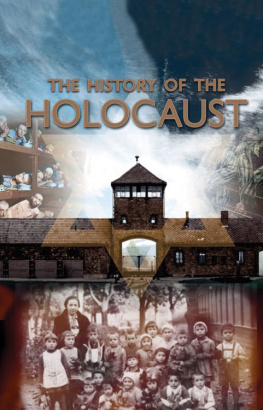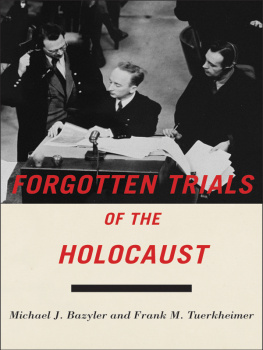Pagebreaks of the print version

Remembering the Holocaust and the Impact on Societies Today
Remembering the Holocaust and the Impact on Societies Today
Simon Bell
First published in Great Britain in 2021 by
Pen & Sword History
An imprint of
Pen & Sword Books Ltd
Yorkshire Philadelphia
Copyright Simon Bell 2021
ISBN 978 1 39901 209 6
eISBN 978 1 39901 210 2
The right of Simon Bell to be identified as Author of this work has been asserted by him in accordance with the Copyright, Designs and Patents Act 1988.
A CIP catalogue record for this book is available from the British Library.
All rights reserved. No part of this book may be reproduced or transmitted in any form or by any means, electronic or mechanical including photocopying, recording or by any information storage and retrieval system, without permission from the Publisher in writing.
Pen & Sword Books Limited incorporates the imprints of Atlas, Archaeology, Aviation, Discovery, Family History, Fiction, History, Maritime, Military, Military Classics, Politics, Select, Transport, True Crime, Air World, Frontline Publishing, Leo Cooper, Remember When, Seaforth Publishing, The Praetorian Press, Wharncliffe Local History, Wharncliffe Transport, Wharncliffe True Crime and White Owl.
For a complete list of Pen & Sword titles please contact
PEN & SWORD BOOKS LIMITED
47 Church Street, Barnsley, South Yorkshire, S70 2AS, England
E-mail:
Website: www.pen-and-sword.co.uk
Or
PEN AND SWORD BOOKS
1950 Lawrence Rd, Havertown, PA 19083, USA
E-mail:
Website: www.penandswordbooks.com
To my wife Bev, my sons Josh and Ben, my sister Jane, and to other family members for always being there .
About the Author
S imon Bell is a former mental health nurse with over thirty-seven years of National Health Service experience in England. The first fifteen years of his career were spent working in hospitals, and included in old asylum care looking after severely damaged, elderly survivors of the war in Europe and of the Holocaust. That instilled a long-held interest not just in the Holocaust but in the consequences of all hatred and discrimination. He has dealt with survivors of other genocides and also liberators who bear the emotional scars of the horrors that they witnessed. For some twenty-two years he worked with mentally disordered offenders, and has dealt with most types of criminal behaviour, witnessed the consequences of crime, and dealt with those who have experienced the extremes of personal trauma. Aside from a clinical role, he also helped to deliver training to a range of mental health, social care and criminal justice workers in helping them to understand and deal with people who have experienced childhood and adult sexual abuse. In the summer of 2016 Simon retired from health care. He has an MA in Second World War Studies: Conflict, Societies, Holocaust. Simon prides himself on not having any formal allegiance to political parties or groups. He is however, dedicated to challenging intolerance and hatred in all of its forms, and seeking to ensure that those who might be targeted or oppressed are supported and cared for. He has been fortunate to have visited Auschwitz-Birkenau on a number of occasions, as well as other sites in Poland that are associated with the Holocaust. He has spent time meeting and exchanging correspondence with survivors and scholars, historians and others who share his interest.
Acknowledgements
A cknowledgements are offered to the academic staff at the University of Wolverhampton, most notably Professor Dieter Steinert, Professor John Buckley, Professor Stephen Badsey and Evelyn Price. Further acknowledgements are offered to visiting lecturers, the Holocaust Educational Trust, and, most importantly, to survivors of the Holocaust and descendants from that period who have offered so much inspiration and encouragement.
Introduction
T he impetus for this book was the decision by the Polish government, in early 2018, to criminalize any suggestion of Polish citizens being involved in the crimes of the Holocaust during the period of the German occupation and subjugation of that territory.
To learn from the past, it is necessary to understand it. Verifiable facts are not disputable, but the interpretation of history is ever changing as new knowledge and information comes to light. This book is not intended as a hostile criticism of any nation. Its intent is to explore the nature of national memory, particularly in nations that experienced the Holocaust first-hand, and how that memory can be sculpted to fit a narrative which sits more comfortably in the psyche of those who are descendants of both perpetrator and victim. Poland is a country I hold with great affection. I am fortunate to have Polish friends and to have visited sites in that land where the dedication to history is robust, respectful and diligent. However, part of this book will address the role of some Poles during the Holocaust when that country was occupied and subjugated by the regime of Nazi Germany. Recent legislation in Poland has sought to criminalize language and writings that suggest any participation by Poles in the Holocaust during the period of German occupation. Some of the background to this legislation stems from understandable frustration with the continued reference to camps such as Auschwitz as Polish camps rather than the more factually correct German Nazi camps. Poles are concerned that the deliberate or inadvertent reference to the camps in this way misrepresents their nation and implies Polish responsibility not just for the function of the camps, but also for other crimes against Jews during the Nazi occupation of the country. Supporters of the legislation correctly observe that, from the commencement of the occupation in 1939, until the liberation in 1945, the Polish state ceased to exist. As such, it cannot be held accountable for the crimes committed by Germany in that territory. Opponents of the legislation raise concerns that a law that criminalizes discussion about the role of Poles in the Holocaust is, in effect, a legislative means of denying accepted historical facts. There are points of debate in both of these perspectives. Antisemitism existed in Poland before the German occupation, it continued during the war, it was on occasion demonstrated by violence, hostility and even murder, and was apparent not just in the immediate post-war period, but has continued to manifest itself since.
Of course, as will be shown, the finger of criticism has been pointed at many nations that were occupied by the Nazi regime, and nations that did not experience that trauma directly. It was not just the violent acts that led to the suffering and death of millions, it was the refusal to help, the willingness to support German forces, the entrenched antisemitism that also manifested in the United States and Great Britain, the lack of interest, the indifference, the antipathy and hostility. These factors empowered and enabled the Nazi regime as much as collusion, collaboration and participation in the crimes.
The Polish Holocaust law has been referred to as ius Grossii in reference to Jan T. Gross, the Polish-born historian who has written extensively about the Jedwabne massacre and the pogrom at Kielce.
The historian Tony Judt observed that Eastern Europe after 1945 had more to remember and also more to forget than Western Europe. Most Jews were killed in the East and local populations participated in the murders. The authorities in the post-war east of the continent appear to have taken care to erase aspects of wartime history including the Holocaust and in the official rhetoric and textbooks Jews are not part of the story.

